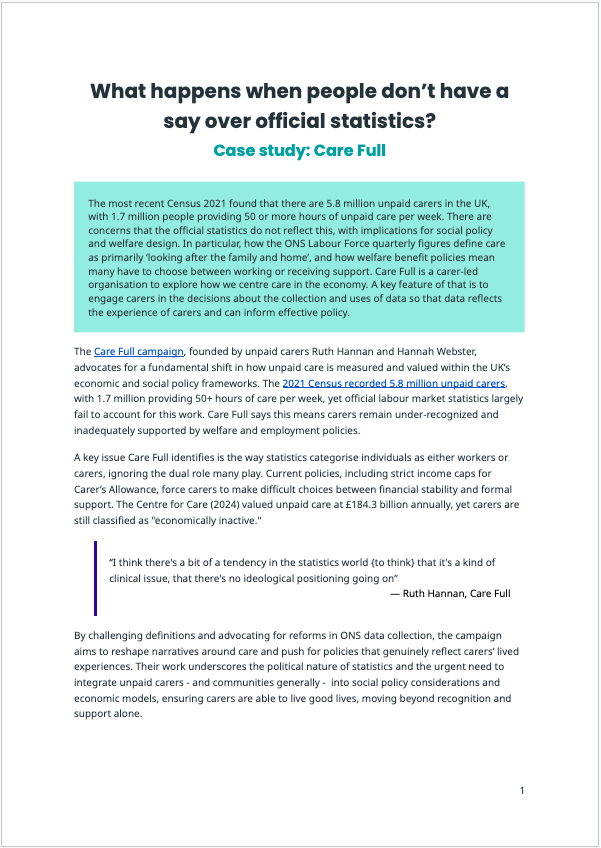What happens when people don’t have a say over official statistics?
Case study: Care Full
The most recent Census 2021 found that there are 5.8 million unpaid carers in the UK, with 1.7 million people providing 50 or more hours of unpaid care per week. There are concerns that the official statistics do not reflect this, with implications for social policy and welfare design. In particular, how the ONS Labour Force quarterly figures define care as primarily ‘looking after the family and home’, and how welfare benefit policies mean many have to choose between working or receiving support. Care Full is a carer-led organisation to explore how we centre care in the economy. A key feature of that is to engage carers in the decisions about the collection and uses of data so that data reflects the experience of carers and can inform effective policy.
This case study is part of a series exploring how public sector organisations involve the public, workers and civil society in decisions about data and AI, and some of the consequences when they do not. Read more about our work on public involvement in public sector data and AI.
The Care Full campaign, founded by unpaid carers Ruth Hannan and Hannah Webster, advocates for a fundamental shift in how unpaid care is measured and valued within the UK’s economic and social policy frameworks. The 2021 Census recorded 5.8 million unpaid carers, with 1.7 million providing 50+ hours of care per week, yet official labour market statistics largely fail to account for this work. Care Full says this means carers remain under-recognized and inadequately supported by welfare and employment policies.
A key issue Care Full identifies is the way statistics categorise individuals as either workers or carers, ignoring the dual role many play. Current policies, including strict income caps for Carer’s Allowance, force carers to make difficult choices between financial stability and formal support. The Centre for Care (2024) valued unpaid care at £184.3 billion annually, yet carers are still classified as “economically inactive.”
“I think there’s a bit of a tendency in the statistics world {to think} that it’s a kind of clinical issue, that there’s no ideological positioning going on” — Ruth Hannan, Care Full
By challenging definitions and advocating for reforms in ONS data collection, the campaign aims to reshape narratives around care and push for policies that genuinely reflect carers’ lived experiences. Their work underscores the political nature of statistics and the urgent need to integrate unpaid carers - and communities generally - into social policy considerations and economic models, ensuring carers are able to live good lives, moving beyond recognition and support alone.

